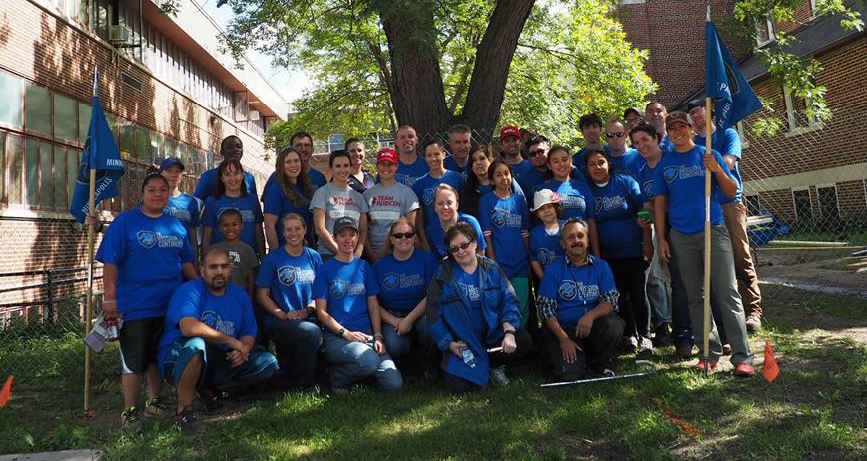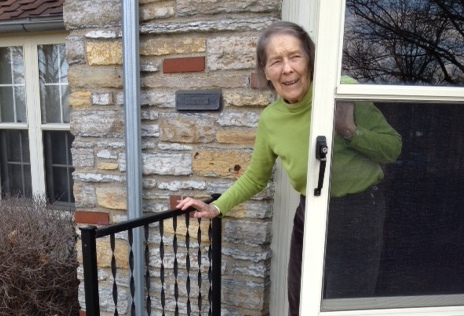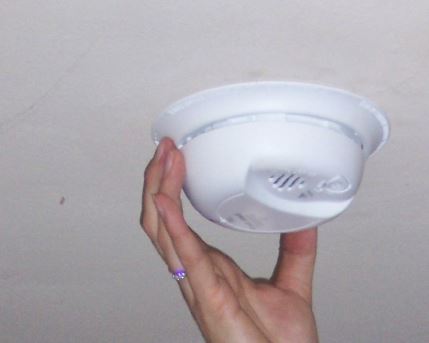Congratulations to our Board member, Melissa Johnston, on being named one of Minneapolis-St Paul Business Journal’s #40under40. The 40 people chosen are business and community leaders in the Twin Cities. Melissa is Vice President of Business Banking at Highland Bank, and we are so thankful to have her on our Board of Directors! Check out the article here.
The Mission Continues Partners with Rebuilding Together
We are thrilled to partner with The Mission Continues, a national nonprofit organization that empowers veterans who are adjusting to life at home to find purpose through community impact. They mobilize veteran volunteers alongside nonprofit partners and community leaders to solve some of the most challenging issues facing local communities: improving community education resources, building community gardens, mentoring at-risk youth and more. Through this service model, veterans build new skills and networks that help them successfully reintegrate into life after the military, while making long-term, sustainable transformations in communities and inspiring future generations to serve.
The Mission Continues has two Service Platoons in the Twin Cities, which are led by veterans and can include veterans of all eras and community members. The Minneapolis Platoon has a long-term relationship with the Phyllis Wheatley Community Center in North Minneapolis, coined Operation North Advance. Since launching of this operation in November 2016, the Minneapolis Platoon has helped the Center by building bookshelves and storage cabinets, conducting light demolition and increasing storage space, painting hallways for the attached school, painting multipurpose room and hallways in the Center’s logo colors, and hanging murals that were stuck in storage on entrance walls.
The Saint Paul Service Platoon has been conducting Service Events at the Saint Paul City Schools for the past two years. They have helped build play equipment for the children, bookshelves, outdoor shed, and outdoor benches. They also laid mulch and painted hallways and classrooms.
We lent our tools to The Mission Continues so they could complete this work, which helped create a better place to live, learn and work in Minneapolis and Saint Paul. Lee Freeman, City Impact Manager at The Mission Continues said of our partnership, “All of these projects are largely due to the tool assistance provided by Rebuilding Together Twin Cities, and we are eternally grateful!”
We look forward to continuing to partner with The Mission Continues!
Partnership with Saint Kate’s Improves our Accessibility Services
We are extremely proud of our partnership with Saint Catherine University’s graduate Occupational Therapy program and Associate Professor Catherine Sullivan.
Through this partnership, we collaborate on service-learning projects that involve graduate occupational therapy (OT) students evaluating the homes of low-income older adults for safety and making recommendations for modifications designed to reduce the risk of falls and other injuries. Our volunteers and/or contractors then make the modifications that are within the scope of our programs. St. Kate’s OT students have completed more than 150 occupational therapy assessments for homeowners in need through this partnership over the last five years.
With the support of the Minnesota Department of Human Services (DHS), we expanded this partnership in 2014 and 2015 to implement more sophisticated assessment tools and conduct an outcome study, which resulted in the publication of a thesis. This study shows how in-home environmental modifications can have a statistically significant impact on improving the mobility of older adults throughout his or her community and within the home, reducing the fear of falling, and increasing the satisfaction and level of performance in completing home occupational tasks.
Our collaboration with Professor Sullivan and her students has enabled Rebuilding Together Twin Cities to provide accessibility modifications for low-income seniors that are tailored specifically to their individual needs and home environment. As a result, we are able to better-serve older adults, allowing them to remain in their homes and neighborhoods for longer. This partnership has served as a catalyst for us to expand our accessibility modification programs to include larger modifications that facilitate single-level living and aging-in-place. It has also fundamentally changed how we evaluate our accessibility programs. We have moved far beyond traditional homeowner satisfaction surveys to a more robust, quantitative pre- and post-project assessment process that can provide statistical data showing the impact of our work. Professor Sullivan and her students have been an important resource in our efforts to help older adults age-in-place successfully and this collaboration has elevated the level of understanding of this work among our staff, Board members, volunteers, and supporters.
We are grateful to Professor Sullivan and her students and look forward to continuing this partnership!
Safe and Healthy Housing in the Twin Cities
Rebuilding Together Twin Cities believes that everyone deserves to live independently in a safe and healthy home, which is why safe and healthy housing is the foundation, framework and focus of all our programs and projects. Current research makes clear that our homes can negatively impact our health and put occupants at high risk for fires, falls, moisture and mold, asthma and allergies, toxic exposures such as carbon monoxide, and various other hazards. Many interventions have been proven effective in reducing and preventing these risks and, in many cases, the repairs are relatively simple and cost very little. However, low-income homeowners often do not have the resources needed to address these hazards in their homes.
The Rebuilding Together affiliate network has embraced safe and healthy housing as our strategic focus, and we are working to incorporate the National Center for Healthy Housing’s Seven Principles of Healthy Homes into practice. Keep the home:
- Dry
- Clean
- Ventilated
- Pest-free
- Safe
- Contaminant-free
- Maintained
Together with the National Center for Healthy Housing, our network has identified 25 Safe and Healthy Home Priorities that can be used to identify safety and health-related issues at each home before the project and to measure the health and safety improvements resulting from our work. Ensuring that low-income homeowners in our community have a safe and healthy home has long been a focus of our work; however, by incorporating these Principles and Priorities founded in scientific research, we hope to further our impact on the safety and health of individual homeowners and neighborhoods in need and more accurately measure and evaluate that impact.




